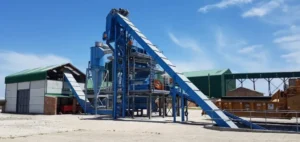Reducing greenhouse gas emissions has become a strategic focus for the global energy industry.
Industrial processes, particularly those linked to ethanol production, are under increasing pressure to reduce their carbon footprint.
In this context, Skyven Technologies has introduced an innovative heat pump that generates high-temperature steam, aiming to optimize energy consumption while reducing CO2 emissions. Western New York Energy, a key player in ethanol production in the United States, is adopting this technology at its Medina facility.
The aim is to reduce the plant’s CO2 emissions by over 20,000 tonnes a year.
This project highlights the central role that heat recovery technologies can play in decarbonizing industrial processes.
Energy optimization and cost reduction
The heat pump introduced by Skyven Technologies is based on mechanical vapor recompression (MVR).
This technology uses electricity to capture waste heat from industrial processes, enabling the generation of high-temperature steam – up to 215°C – without recourse to fossil fuels.
This ability to generate clean steam from existing heat sources reduces dependence on costly, polluting energy resources.
The integration of this technology at Western New York Energy aims not only to reduce greenhouse gas emissions, but also to cut energy-related production costs.
By recovering and reusing heat already present in processes, the plant optimizes its energy efficiency while making substantial savings.
Reducing carbon intensity
Another key benefit of this project is the reduction in the carbon intensity (CI) of the Medina plant.
By reducing the amount of CO2 emitted per unit of energy produced, the plant positions itself more favorably on the energy and carbon credit markets.
It also enhances Western New York Energy’s competitiveness, particularly in a context of tightening environmental regulations and rising pollution costs.
The US ethanol market is particularly sensitive to these developments, and players like Western New York Energy are under pressure to reduce their carbon footprint while keeping production costs low.
By investing in this new heat pump technology, the company is responding proactively to these challenges, anticipating future market constraints.
Outlook for the ethanol industry
The ethanol industry, traditionally dependent on the combustion of fossil fuels to generate the steam needed for its processes, sees this technology as an opportunity for modernization.
The adoption of heat pumps for steam generation could transform this industry’s production methods, notably by reducing the costs associated with energy consumption.
The example set by Western New York Energy could encourage other ethanol producers, both in the United States and around the world, to consider similar solutions.
Skyven Technologies’ technology offers a viable alternative to traditional systems, reducing CO2 emissions while optimizing energy costs.
Challenges and opportunities for heat pump adoption
The widespread adoption of industrial heat pumps will depend on a number of factors, including installation and maintenance costs, as well as long-term profitability for industrial companies.
If the first installations demonstrate significant energy and economic gains, as anticipated in the case of Western New York Energy, it is likely that other industrial players will follow suit.
The regulatory context will also play a decisive role.
As environmental standards become more stringent, it will be in companies’ best interests to equip themselves with technologies that reduce their environmental impact without affecting their productivity.
Steam-generation heat pumps, such as the one developed by Skyven Technologies, offer an interesting solution in this respect.
The adoption of this technology could also pave the way for new collaborations between players in the energy sector and industry.
The ability of heat pumps to adapt to different industrial environments, while offering substantial energy gains, makes them an attractive solution for a wide range of sectors.






















